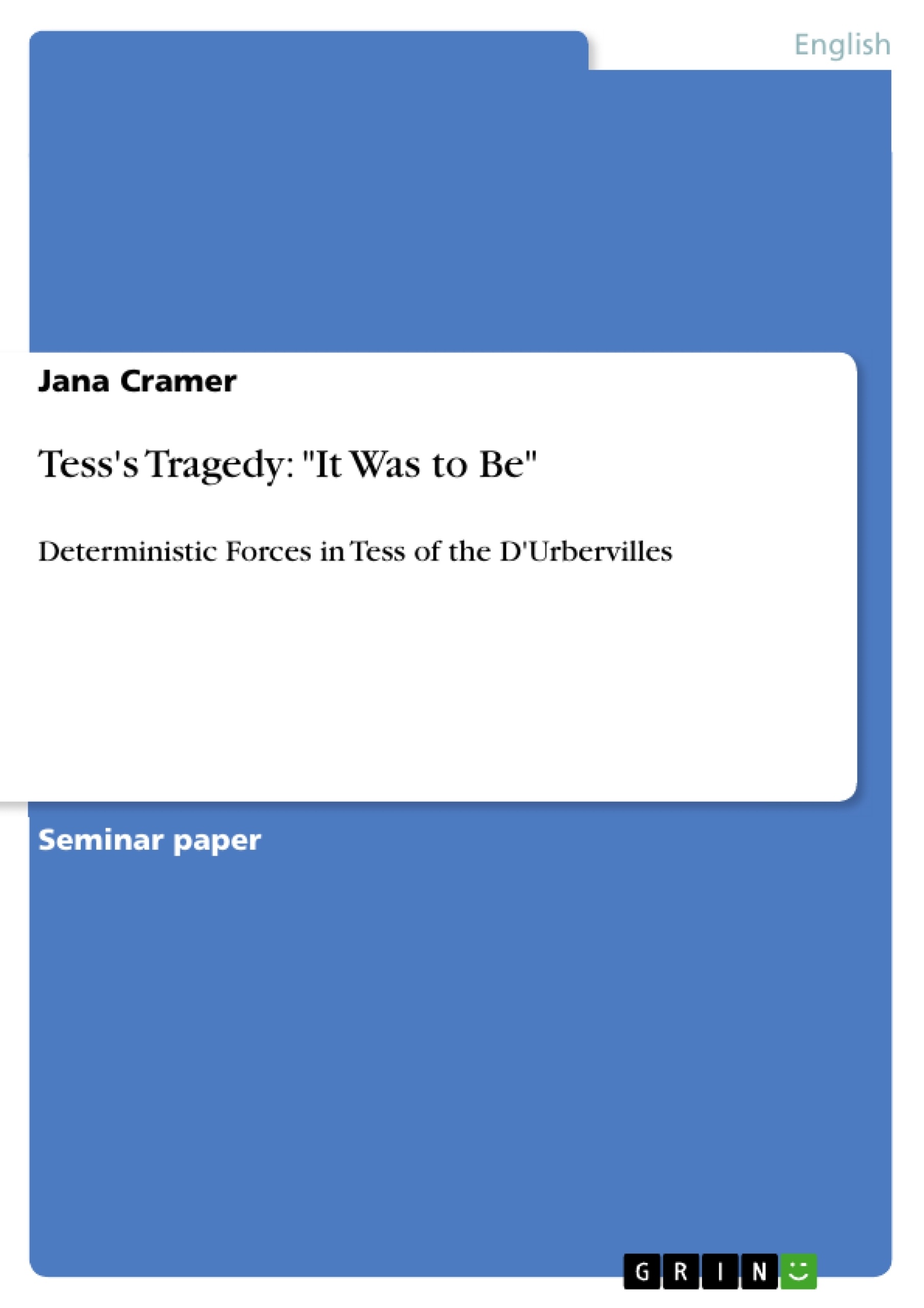Thomas Hardy’s novel Tess of the D’Urbervilles was published in 1891, a time coined by change in technique and sciences. The English naturalist Darwin established his theory about evolution and natural selection, and physicists discovered that there are fixed elemental laws which inanimate objects follow. These discoveries also spread in the domains of humanities. In his essay “The Experimental Novel”, published in 1880, the French writer Émile Zola claims that the scientific method, which is observation and experimentation, can and should be applied to literature as well. He argues that writers can experiment with their characters like scientists do with their objects of study by placing them into certain surroundings and changing some conditions in the fictional world. These different surroundings and conditions then will determine the novel’s course. Thus, Zola concludes that if the inanimate world is fixed by certain laws, “[a] like determinism will govern . . . the brain of a man” (17) and the character’s fate is already fixed by the novel’s setting.
The subtitle of Tess of the D’Urbervilles – “A Pure Woman” – has aroused a need for discussion in the Victorian Age as well as today. There are “[t]hose who thought the ‘little harlot’ deserved hanging . . . [and] those who pitied her as a ‘poor wronged innocent’” (Hardy 2003, xix). The question of guilt is a central theme in Hardy’s novel. Is Tess “more sinned against than sinning” (232)? Having Zola’s theory in mind, it is rather the first that applies for Tess’s story.
Table of Contents
- Introduction
- The Inevitability of Fate – A Word on Determinism
- Tess as a Victim of Deterministic Forces
- The Inevitable Way to the Fallen Woman
- Determinism after the Rape
- The Deterministic Force of Angel Clare
- Tess's Attempts to Act - The Interference of a Transcendental Power
- Conclusion
Objectives and Key Themes
This paper aims to analyze the extent to which Thomas Hardy's heroine Tess d'Urberville is a victim of deterministic forces, exploring the various factors that shape her life and destiny. The paper investigates whether Tess is truly a passive victim of forces beyond her control or if she possesses the agency to shape her own life.
- The influence of determinism on Tess's life and tragedy
- The role of social and moral conventions in shaping Tess's fate
- The impact of heredity and biological predispositions on Tess's character
- Tess's limited agency and the forces that constrain her choices
- The role of external factors, such as societal expectations and the actions of others, in Tess's downfall.
Chapter Summaries
The introduction sets the stage for the analysis of Tess's tragedy within the context of Victorian society and the emerging theories of determinism. It establishes the question of Tess's guilt and the concept of a "fallen woman," raising the question of whether she is more "sinned against than sinning." The chapter further introduces the concept of determinism, highlighting its significance in understanding Tess's fate.
The chapter "The Inevitability of Fate – A Word on Determinism" delves into the philosophical concept of determinism, contrasting Tess's story with that of active protagonists like Don Carlos and Hamlet. The chapter explores different interpretations of determinism, including Fatalism and the influence of biological and social laws. It further examines internal and external factors, such as heredity, social environment, and moral conventions, which contribute to the shaping of an individual's character and fate.
The chapter "Tess as a Victim of Deterministic Forces" examines the various forces that contribute to Tess's downfall. It analyzes the "inevitable way to the fallen woman" and explores how societal expectations, specifically the Victorian conception of gender and sexuality, contribute to Tess's predetermined fate. The chapter also examines how the rape and its aftermath further reinforce the deterministic forces at play in Tess's life. Finally, the chapter investigates the deterministic force of Angel Clare, highlighting his impact on Tess's trajectory.
Keywords
The key themes and concepts explored in this paper include determinism, fatalism, Victorian society, gender roles, social conventions, heredity, agency, free will, Tess d'Urbervilles, fallen woman, tragedy, and the influence of external forces on individual destiny. These concepts are interwoven to provide a nuanced understanding of Tess's story and her tragic fate.
Frequently Asked Questions
What is the central theme of Thomas Hardy's "Tess of the D’Urbervilles"?
The central theme is the question of guilt and innocence, exploring whether the protagonist, Tess, is a "pure woman" or a victim of circumstances and deterministic forces beyond her control.
How does determinism apply to Tess's story?
Determinism suggests that Tess's fate is fixed by her environment, heredity, and social conditions. According to this view, she is a passive victim of forces like Victorian social conventions and biological predispositions.
What was the influence of Charles Darwin on the novel?
Darwin's theories on evolution and natural selection influenced the idea that fixed laws govern human life and character, much like they govern the natural world, a concept Hardy integrated into his narrative.
What does the subtitle "A Pure Woman" signify?
The subtitle was highly controversial in the Victorian era. It challenges the societal definition of a "fallen woman" by suggesting that despite her experiences, Tess remains inherently pure in spirit.
Who is Angel Clare in the context of Tess's tragedy?
Angel Clare is a character who represents a deterministic force in Tess's life. His rigid adherence to social and moral ideals ultimately contributes to Tess's downfall and tragic end.
- Citar trabajo
- Jana Cramer (Autor), 2013, Tess's Tragedy: "It Was to Be", Múnich, GRIN Verlag, https://www.grin.com/document/266171



